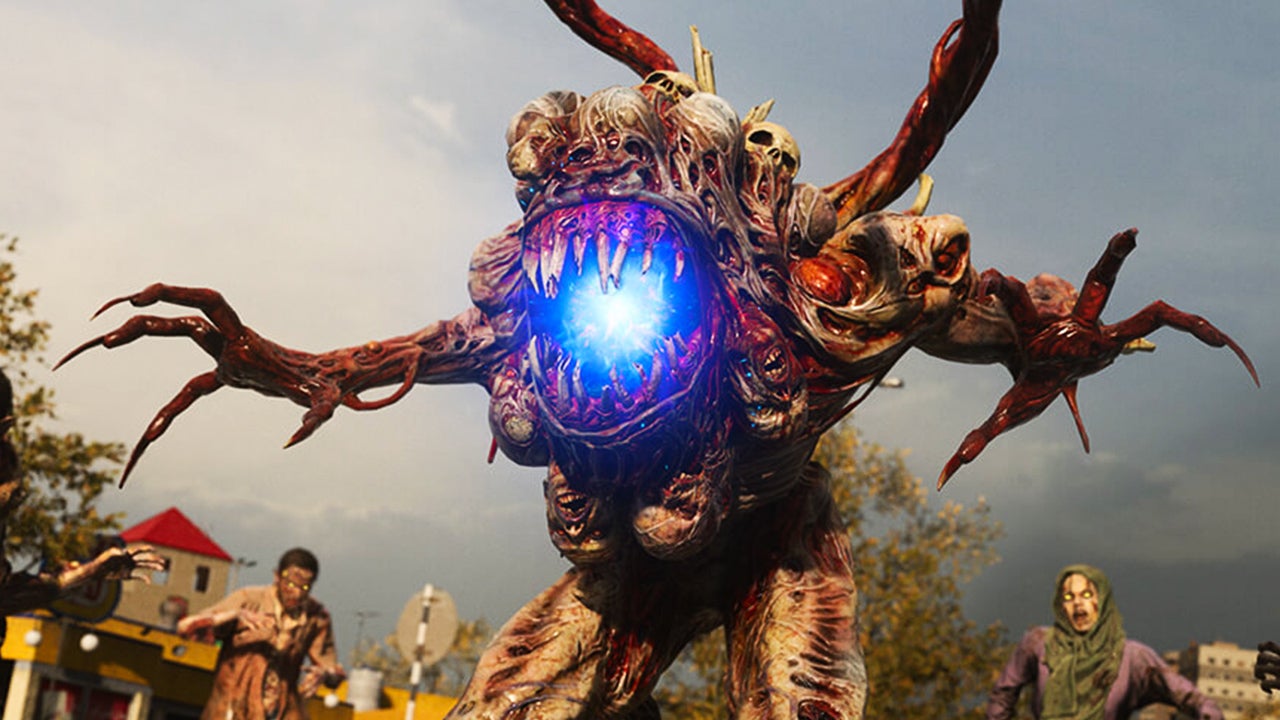Tom Marks
Curated From www.ign.com Check Them Out For More Content.
This is our Zombies review for Call of Duty: Modern Warfare 3. Check out the single-player review for our thoughts on the campaign or the multiplayer review for our thoughts on PvP.
Like a lot of Call of Duty: Modern Warfare 3, this year’s Zombies mode has undergone what might be described as a “Warzone-ification,” forcing its traditional PvE elements into a larger, more open map. But as popular as the Warzone side of Call of Duty (or in this case, the extraction shooter mode, DMZ) might be, mixing it together with Zombies has had the effect of diluting both. This is less a new take on Zombies than it is a DMZ reskin, with disparate elements cherry-picked from both modes mashed against one another and made to kiss. If you can stick with it long enough to reach high-difficulty areas and top-level content, it can take you to some excellent, intense moments. But its huge size, and the slow pace created as a result, often makes it feel at odds with what was fun about Zombies in the past.
Operation Deadbolt, the name for Modern Warfare 3’s Zombies mode, takes place on a version of the upcoming Warzone map of Urzikstan. Gone are the usual wave-based battles through smaller, dedicated maps that you explore and unlock as you go. Instead, the moment-to-moment gist of the mode is almost exactly what you encounter in DMZ. You and two squadmates head into the map, search for cool stuff and complete activities called Contracts to earn money to buy upgrades and items, and call a helicopter to escape with your loot before you’re either overwhelmed by enemies or the 45-minute match timer expires. In the early going, apart from the zombies themselves and a few familiar temporary power-ups and Perk Colas, this Zombies mode doesn’t feel much like Zombies at all.
The openness of DMZ lets you choose your battles, and it’s that approach that defines Operation Deadbolt – but it lacks one fundamental piece of what makes DMZ fun: a player-vs-player element. There are always around 24 other players in an Operation Deadbolt match, but you can only interact with them cooperatively – you have to appreciate that trolls will be denied the thrill of the hunt, but it also removes an element of danger from mindless enemies. You’ll pick your way across the map to take on strongholds full of computer-controlled mercenary soldiers, or complete small, objective-based contracts that can earn you money to spend on perks or weapon upgrades. You generally decide which encounters to take on and when, and only venture further inland to areas designated with a higher difficulty once you’re fully prepared. Without the PvP aspect, the lower-difficulty area and activities of Operation Deadbolt end up being pretty easy, and pretty dull as a result.
The slower and more thoughtful gameplay of DMZ contrasts with the usual setup of Zombies, which is all about the mounting tension of finding better weapons, setting up defenses, and exploring the map while constantly fighting off ever-tougher waves of enemies. The lack of a pressing threat in Operation Deadbolt means you can spend a whole session on low-difficulty, relatively boring activities, just to prepare for something more interesting.
But the two different gameplay approaches start to gel much better as you get deeper in and venture into tougher areas. The more difficult locations (it gets harder the closer you get to the map’s center) increase the intensity of battles, the ambient dread that any encounter could go sideways, unexpected complications, and the risk of losing all your great gear — all the things that make both DMZ and past Zombies modes exciting. The Urzikstan map is divided into three areas, or “threat levels,” and the differences in the zones is stark — Threat Level 2 has zombies that you can barely deal with using weapons you haven’t upgraded with a Pack-a-Punch machine, for example, and it’s rife with bigger creatures and special zombies that show up at random much more often. Things are, as you’d expect, even tougher in Threat Level 3, where giant boss monsters maraud freely and even low-level zombies are decked out in strong armor. You’re still able to choose which activities to engage with as you move up in difficulty, but they’re all more challenging, and just crossing the map in these areas requires you to pay much more attention to keeping yourself and your team alive.
And once the challenge starts to ramp up, the traditional Zombies gameplay elements are much more important. Having the right Perk Colas and seeking out Pack-a-Punch machines becomes the difference between a successful session and a painful defeat, and the extraction mechanics of DMZ add exactly the right kind of dread as you fight to protect your exfiltration helicopter from huge zombie throngs of anywhere from tens to what feels like a hundred or more. Planning your forays across the map becomes essential, but all the different enemies, weapons, upgrades, equipment, and random short-lived Zombies power-ups you can find along the way combine to make sessions exciting and unpredictable. Add the panic that comes with the fear of losing everything you’ve earned in a run, and Operation Deadbolt can get even an undead heart pumping.
So while the DMZ and Zombies elements sometimes work against each other, when they do come together Operation Deadbolt can be a lot of fun. Running around looting buildings, only to discover too late that one houses a powerful special monster – like the tentacled Mimic – is exciting and harrowing. Sweeping a mercenary stronghold room by room makes for some thrilling firefights, especially with the knowledge that zombies are likely creeping up behind you as you do. Zombies-focused spins on Contracts, where you complete small events like defending a location against the hordes or fighting through mercenaries to defuse missiles before they launch, can be fun as the difficulty ramps up, so long as you make the effort to vary your choices frequently to avoid too much repetition.
The inclusion of other friendly players in a match can also add an unexpected, fun dimension to Operation Deadbolt. Finding other players and teaming up with them on the fly to make a double-sized squad, or getting revived and saved from losing your stuff by a passer-by, adds a life to Zombies that’s new to the experience. Co-op with other random players isn’t a big focus of the mode, but it still gives you another opportunity to shake things up that doesn’t detract from your PvE experience with PvP griefing.
The trouble is that Operation Deadbolt is so uneven, requiring you to build up to the fun by choosing the right activities and holding back from anything too difficult until you have the gear to handle it. A lot of time is spent on preparation, looting, and earning money by repeating easy contracts to power yourself up so you can risk venturing into the areas that are actually entertaining. And while the risk of death adds necessary tension to more dangerous expeditions, scouring the map for equipment to get yourself back to where you were after a loss is a big, boring time-suck.
Slow pacing infests all of Operation Deadbolt, but it does the most damage to the story. There’s a linear tale to uncover here, but unlike past Zombies campaigns, it’s not hidden away in puzzles and Easter eggs you need to discover on the map. Instead, it’s all deployed through uninspired, MMO-like mini-objectives, like using a Pack-a-Punch to power up a gun and then killing 50 zombies with it. Complete enough of them and you’ll get to play dedicated story missions, but there’s a huge amount of tedious stuff to get through before you can even see what Operation Deadbolt’s plot is about — it took about two dozen hours for me to grind through enough to access the first one, which I still haven’t played due to a bug.
There are some fun objectives, like the ones that push you to engage with different content, such as mercenary strongholds or zombie nests, but the majority carry dull requirements to get specific weapons and kill specific enemies with them. One required me to freeze a bunch of zombies and fiery hellhound enemies, so I had to first track down Cryo ammo (a random drop in Contract rewards and certain kinds of loot stashes) then find the right enemies to shoot with it. Hellhounds are pretty weak, though, and often die before they freeze. They’re also rarer than zombies out in the world, which meant I had to kill a whole lot of zombies in order to find enough hellhounds just to clear the requirement of freezing 10 — and if I didn’t complete the objective before we had to exfiltrate from the mission, I needed to go find another Cryo ammo upgrade to wrap it up. To put it delicately, that was not a highpoint of my playtime with Modern Warfare 3’s Zombies mode.
Progress on these story quests is a slog to earn, often requiring you to find very specific ammo upgrades or power-ups and use them against specific enemies. These are the sort of objectives you should be knocking out as you do other, more fun things, but Operation Deadbolt locks you into only working on one objective at a time, which you choose before you drop. If you manage to clear an objective, you get access to a new one automatically mid-session, but you can’t change them on the fly or work on several at once, which means there’s no way to make progress if you don’t have the correct equipment. This approach repeatedly grinds your ability to progress and experience the story to a complete, irritating halt.
Seeking out the items you need, like ammo upgrades or perks, slows things down even more, since those items are mostly handed out randomly from completing activities. Many objectives require specific equipment, and some of those objectives are tough to complete in a single session, so you’ll need more than one drop to get them done. And that means spending session after session clearing the same two or three activities, hoping to get the right ammo reward. Again, it all amounts to a lot of time spent doing things you don’t want to do, just so you can get to the things you do.
I finally unlocked the first of three story missions after about 25 hours. That’s when Treyarch released an update for Zombies, which came with a game-breaking bug blocking access to the story missions. So that’s where I have to tap out. And honestly, after all that tedium and frustration, whatever interest I had in the story mission evaporated a long time ago. It’s also why I’m writing this review without having seen the complete Operation Deadbolt story — I’ve spent dozens of hours with it, and a couple of dedicated story missions aren’t going to redeem all the time lost trying to unlock them.
I have one final note: The sloggy progression is made even the worse by the sessions where something goes wrong. There was the game-breaking bug mentioned above (that not only blocked story advancement, it totally broke the ability to exfiltrate from the map at all, costing me all my gear) but it was far from the only time technical issues resulted in big losses. My experience – on PC – has seen five or six crashes to desktop and a number of losses of connectivity to Call of Duty’s servers. Each of those are treated as losses in Zombies, which means that through no fault of your own you lose your gear to technical snafus. Along with some smaller issues like lag and stuttering, or zombies clipping through walls you thought would keep you safe, it’s enough to kill otherwise fun runs and sap the desire to keep going back.

